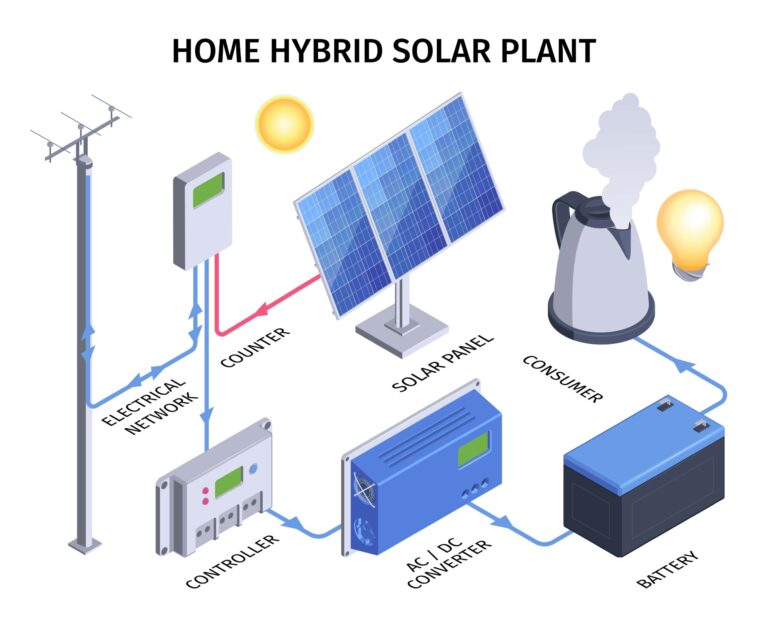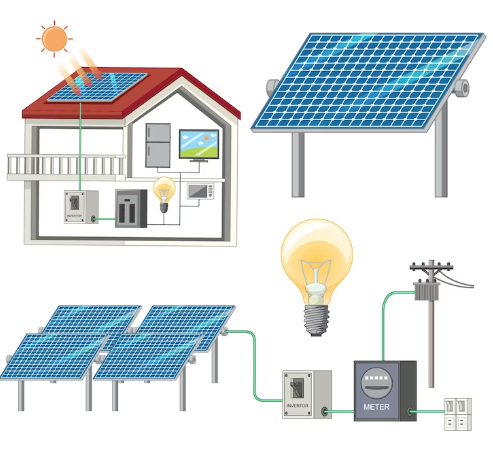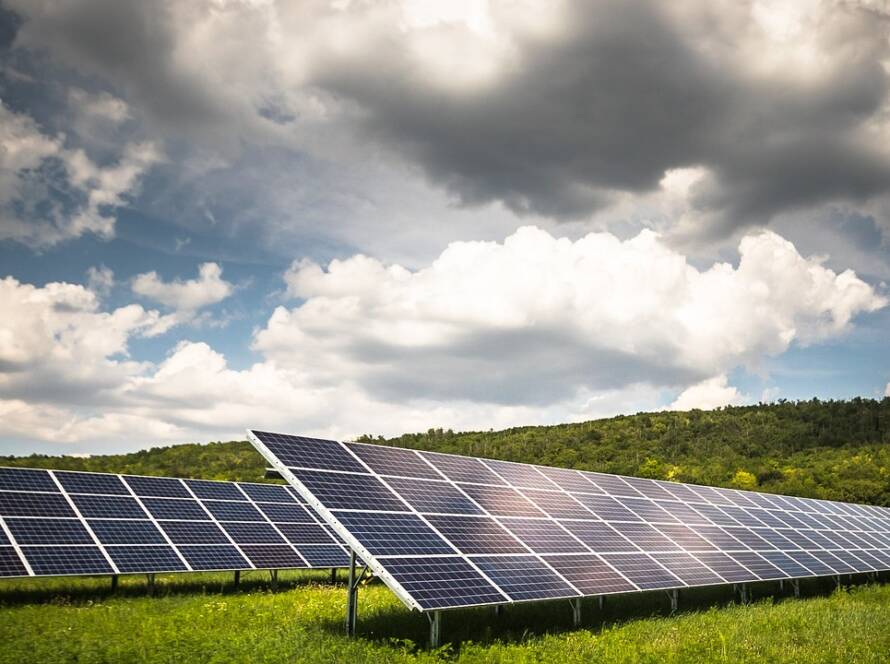Hybrid Solar Systems: How They Work, Their Price, and Their Benefits
The urgent need to combat climate change has propelled the importance of renewable energy harnessing. Solar power has emerged as a dependable and progressively favored sustainable energy option.
Hybrid solar systems have gained substantial recognition in recent years due to their innovative approach and multitude of advantages.
This blog aims to delve into the workings of hybrid solar systems, discuss their pricing considerations, and shed light on the extensive benefits they offer.
Components of Hybrid Solar System
A hybrid solar system comprises several key components that work together to harness and optimize solar energy.
- Solar Panels: Solar panels, also known as photovoltaic (PV) panels, are at the core of any solar system. These panels are typically made up of multiple interconnected solar cells that convert sunlight into electricity.
- Inverter: An inverter is an essential component of a hybrid solar system. Its primary function is to convert the DC electricity produced by the solar panels into alternating current (AC) electricity, which is the type of electricity used in most households and businesses.

- Energy Storage System (ESS): The energy storage system (ESS) is a vital component of a hybrid solar system that enables energy storage for later use. It typically consists of batteries that store excess electricity generated by the solar panels during the day.
- Charge Controller: A charge controller is responsible for managing the charging and discharging of the batteries in the energy storage system. It regulates the flow of electricity between the solar panels, the batteries, and the loads.
- Grid Connection: A hybrid solar system is connected to the electrical grid, allowing for a seamless exchange of electricity between the system and the grid. This connection enables homeowners to draw power from the grid during times when the solar energy production is insufficient.
How Does a Hybrid Solar System Work?
A hybrid solar system combines the functionalities of both grid-tied (on-grid) and off-grid solar systems to provide a comprehensive and reliable energy solution. Let’s delve into how the solar system works:
- Solar Power Generation: The process begins with solar panels, which are installed on rooftops or in open areas with maximum exposure to sunlight. These panels contain photovoltaic cells that convert sunlight into direct current (DC) electricity.
- Power Conversion: The DC electricity generated by the solar panels needs to be converted into alternating current (AC) electricity, which is the type of electricity used in homes and businesses. An inverter, a key component of a hybrid solar system, performs this conversion.
- Energy Storage: One distinguishing feature of a hybrid solar system is the inclusion of an energy storage system (ESS). Excess solar energy that is not immediately consumed by the loads can be stored in batteries within the ESS.
- Grid Interaction: A hybrid solar system is connected to the electrical grid, which offers several advantages. When the solar panels produce more electricity than the home’s energy needs, the excess energy can be fed back into the grid.
- System Control and Monitoring: To optimize the performance and efficiency of the hybrid solar system, advanced control and monitoring systems are often integrated. These systems allow homeowners to monitor and manage the energy flow, battery status, and overall system performance.
Hybrid Solar System Cost
While hybrid solar systems are generally more expensive compared to conventional on-grid or off-grid systems, the investment can lead to significant long-term benefits such as reduced electricity bills and uninterrupted power supply.
Hybrid solar system price in India for 1 kW is expected to range from ₹1,00,000 to ₹15,00,000 for a 20 kW system. However, it’s important to note that prices can vary based on factors such as the quality of components, manufacturers, availability, and other considerations.
Advantages of Hybrid Solar System
Hybrid solar systems offer a multitude of advantages, making them an appealing choice for homeowners seeking sustainable and reliable energy solutions.
- Energy Independence:
One of the significant benefits of hybrid solar systems is the ability to achieve energy independence. By combining solar panels with energy storage capabilities, homeowners can rely less on the electrical grid.
- Reduced Electricity Bills:
Hybrid solar systems enable homeowners to significantly reduce their electricity bills. During times of ample solar energy production, excess electricity can be fed back into the grid, potentially earning credits or financial compensation through net metering or feed-in tariffs.
- Flexibility and Grid Support:
Hybrid solar systems provide flexibility by allowing homeowners to switch seamlessly between grid-tied and off-grid operation.
- Environmental Benefits:
By harnessing solar energy, hybrid solar systems contribute to a greener and more sustainable environment. Solar power is a clean and renewable energy source that produces minimal greenhouse gas emissions compared to traditional fossil fuel-based electricity generation.
- Energy Resilience:
With the inclusion of energy storage systems, hybrid solar systems provide an added layer of energy resilience. In the event of a grid outage or natural disaster, the stored energy in the batteries can power essential appliances and critical loads, ensuring comfort, and safety, and functionality during emergencies.
Conclusion
Hybrid solar systems offer an innovative and sustainable approach to meeting energy needs. By integrating solar panels, energy storage systems, and specialized inverters, these systems provide homeowners with energy independence, cost savings, and a reduced environmental footprint.
While the initial investment may require careful consideration, the long-term benefits and positive impact on both the household and the planet make hybrid solar systems a promising choice for a greener future.
FAQs
The battery life of a hybrid solar system typically ranges from 5 to 15 years, depending on factors such as battery chemistry, usage patterns, and maintenance.
Yes, hybrid solar systems are suitable for all climates as they can effectively harness solar energy regardless of the weather conditions, although the energy output may vary.
The lifespan of a hybrid inverter typically ranges from 10 to 20 years, depending on factors such as quality, usage, and maintenance.
Subsidies for hybrid solar systems vary by country and region. It’s advisable to check with local government or energy authorities for information on available subsidies or incentives.
The price of a 5kW hybrid solar system in India with a subsidy can vary depending on the specific subsidy program and region. It’s recommended to consult local authorities or solar system providers for accurate pricing details.
The cost of a 1kW hybrid solar inverter in India can range from approximately ₹10,000 to ₹25,000, depending on the brand and features.
The lifespan of a hybrid solar system typically ranges from 25 to 30 years, with proper maintenance and regular component replacements.

Ileen Kaur (Author)
Ileen Kaur is an exceptional content writer, bringing her expertise and creativity to the digital realm. With a passion for storytelling and a knack for crafting compelling narratives, she has the power to captivate audiences and leave a lasting impression.


